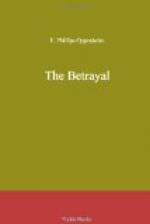“Tell us, Mr. Ducaine,” Lord Chelsford said, “what your reasons were for making such a statement.”
I took a piece of red tape and a newspaper from the table before which I stood. I folded up the newspaper and tied the tape around it.
“When I put those documents away,” I said, “I tied them up with a knot like this, of my own invention, which I have never seen used by anybody else. In the morning I found that my knot had been untied, and that the tape around the papers had been re-tied in an ordinary bow.”
“Will you permit me for a moment,” the Duke interposed. “The safe, I believe, Mr. Ducaine, was secured with a code lock, the word of which was known to-whom?”
“Yourself, sir, Colonel Ray, and myself.”
The Duke nodded.
“If I remember rightly,” he said, “the code word was never mentioned, but was written on a piece of paper, glanced at by each of us in turn, and immediately destroyed.”
“That is quite true, sir.”
“Now, do you believe, Mr. Ducaine,” the Duke continued, “that it was possible for any one else except us the to have attained to the knowledge of that word.”
“I do not sir,” I admitted.
“Do you believe that it was possible for any one to have opened the safe without the knowledge of that word?”
“Without breaking it open, no, sir.”
“There were no signs of the lock having been tampered with when you went to it in the morning?” “None, sir.”
“It was set at the correct word, the word known only to Colonel Ray, myself, and yourself?” “Yes, sir.”
The Duke leaned back in his chair and addressed Lord Cheisford.
“For the reasons which you have heard from Mr. Ducaine himself,” he said drily, “I came to the conclusion that he was mistaken in his suggestion. I think that you will probably be inclined to agree with me.”
These men had learnt well the art of masking their feelings. From Lord Chelsford’s polite bow I could gather nothing.
“I am forced to admit,” he said, “that no other conclusion seems possible. Now, Mr. Ducaine, with regard to the execution of your work. It is carried out altogether, I believe, at the ’Brand’?”
“Entirely, sir.”
“Your only servant is the man Grooton, for whom the Duke and I myself are prepared to vouch. You are also watched by detectives residing in the village, as I dare say you know. I also understand that you have no private correspondence, and receive practically no visitors. Now tell me the only persons who, to your knowledge, have entered the ‘Brand’ since you have been engaged in this work.”
I answered him at once.
“Colonel Ray, Lady Angela Harberly, Lord Blenavon, the Prince of Malors, and a young lady called Blanche Moyat, the daughter of a farmer in Braster at whose house I used sometimes to visit.”
Lord Chelsford referred to some notes in his hand. Then he leaned back in his chair, and looked at me steadfastly.




